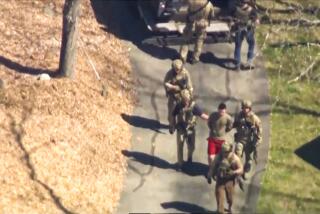Ex-Navy SEAL who wrote Bin Laden book gets warning from Pentagon
WASHINGTON — The Pentagon formally warned a former Navy SEAL who has written a first-person account of the raid that killed Osama bin Laden last year, saying he has violated his signed agreement not to divulge classified information, and it threatened him with stiff legal action.
“In the judgment of the Department of Defense, you are in material breach and violation of the non-disclosure agreements you signed,” Pentagon General Counsel Jeh Johnson said Thursday in a letter addressed to Mark Owen, the pen name of Matt Bissonnette.
Johnson did not specify what in Bissonnette’s forthcoming book, “No Easy Day,” constitutes improperly disclosed classified information. But he said military lawyers are considering “all legal remedies available to us.”
PHOTOS: The death of Osama bin Laden
Officials said that could include a lawsuit aimed at claiming profit from the book, which is being published by Dutton, part of Penguin Group. Due to be released next week, “No Easy Day” is already on bestseller lists because of heavy advance sales.
The letter is the strongest signal yet that the Obama administration, which has come under fire for alleged leaks of national security information, is prepared to crack down on an unauthorized release of classified information, even by a former member of an elite military unit lionized by the public.
Bissonnette did not submit his manuscript for review by the Pentagon as he was required to do under a nondisclosure agreement he signed in 2007, Johnson wrote in the letter. Johnson’s letter cites a provision in the agreement that requires Bissonnette to seek permission from the Defense Department before publishing a manuscript containing possibly classified information. Any profit from a book containing classified information would be “assigned to the U.S. government,” the agreement says.
Bissonnette, 36, who has been awarded five bronze stars, left the Navy in April. Before he did so, he signed another legal agreement that “acknowledged your understanding” of the requirement to seek Pentagon approval before publishing a book, Johnson’s letter states.
In April, a federal judge in Alexandria, Va., ruled that a former CIA case officer had to forfeit any earnings from a book he wrote that was published without CIA permission. The former officer, writing under the pseudonym Ishmael Jones, had submitted “The Human Factor: Inside the CIA’s Dysfunctional Intelligence Culture” to be reviewed for classified information, but it went on sale before the review was complete.
“No Easy Day” is the first account by a member of SEAL Team Six, which carried out the stealthy nighttime assault on Bin Laden’s compound in Abbottabad, Pakistan, in May 2011. The publisher provided a copy to The Times.
In an author’s note, Bissonnette wrote that “all of the material contained within this book is derived from unclassified publications and sources,” and a list of sources is printed at the end of the volume. He also says he hired a former special operations attorney to review the text for classified information.
“It is important to me that no classified information is released” so that the book “cannot be used by sophisticated enemies as a source of sensitive information to compromise or harm the United States,” he wrote.
But the book recounts Bissonnette’s role in a highly classified operation by SEAL snipers who killed three pirates and rescued the captain of the Maersk Alabama, a cargo ship hijacked off Somalia in April 2009.
He also describes operations with Delta Force, the Army’s most elite commando unit. Its existence, though well known, is classified. He also gives details about Joint Special Operations Command’s presence in Afghanistan, another classified matter.
In his account of the Bin Laden raid, Bissonnette and his coauthor, Kevin Maurer, at times provide specific descriptions of tactics, planning and meetings that appear to involve sensitive information.
PHOTOS: The death of Osama bin Laden
He describes how U.S. surveillance drones kept watch over Bin Laden’s compound, and he recounts the time a Pakistani army helicopter flew overhead as a man believed to be Bin Laden was walking around the compound. Bissonnette and a CIA intelligence analyst observed from the drone video that the man did not look up or seem alarmed about the helicopter, leading them to conclude that the SEAL team could fly to the hide-out by helicopter without immediately alerting people inside.
He also writes that if the SEALs were captured by Pakistani military or police, they had been instructed to say they were on a secret mission to find a downed drone. But the Navy commandos also had authority to open fire on Pakistani troops if necessary, he says.
“The president had already given us the green light to protect ourselves, even if we had to engage the Pakistani military,” he writes.
More to Read
Sign up for Essential California
The most important California stories and recommendations in your inbox every morning.
You may occasionally receive promotional content from the Los Angeles Times.











